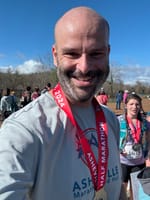Below is an essay that was originally published on isreallycool.com
David Lange is a proud Zionist from Australia who moved to Israel and writes for his website isreallycool.com. He writes about Jewish and Israeli issues with a particular focus on antisemitism.
I first interacted with David Lange after he read an article I wrote about my experience working at an Orthodox Jewish School in NYC. He liked how I described how students can bravely express their opinions, which I attribute to how Jewish students are taught to read the Talmud and multiple commentaries and interpretations on religious law, and we struck up a conversation.
From there he agreed to publish an essay I wrote about peanut allergies and Israel and how I resolved my love of Roald Dahl's books with his anti-Semitic remarks. It is a bit complicated so I will just link to it if you are interested in how I made those connections.

David and I had planned to record a Zoom call where we explored issues and challenges within Jewish education. I was very much looking forward to learning about how Jewish education in Israel contrasts with what I experienced in NYC. I still hope that can discussion happen down the road, but then the brutal and awful attack of October 7th occurred. Naturally exploring other issues has to take a back seat.
Marc Lamont Hill is a scholar, activist and journalist. His academic interests are focused on social justice, antiracism and colonial history.
I don't have any personal connection to Dr. Hill but I have watched many of his videos on YouTube. He strikes me as a thoughtful man with deep convictions about equity and how race has played a role in denying justice throughout history.
These two men see the Palestine-Israel conflict as two completely different narratives
They decided to have a debate on YouTube. It is just over an hour and it is absolutely wonderful.
What is the telos, or purpose, of a debate?
Is it to convince the other side that you are correct? Is it to score points and win by demonstrating how much more you know than your opponent? Is it to preach to the choir that already agrees with you?
If that is the case then I guess you can say both men won the debate. They had points that people who agree with them would cheer.
But if the telos of debate is to hone your own views, while trying to understand your opponents views, and maybe even finding common ground, then I think everyone wins, not just the participants.
I consider myself a bridge builder. Someone gave me that title a few years ago when my school was deep in navigating the acrimony that erupted after the George Floyd was killed. I wrote about that experience in an essay titled "activists, academics and bridgebuilders".
I tried, in those tough months, to help students navigate through their anger, while at the same time helping students to direct their rage in productive ways that weren't ultimately self destructive. During that time a coworker told me that I was a bridgebuilder.
It is a title I wear with pride. There are few people out there that are willing to engage people with whom they completely disagree. This is particularly acute in the age of social media and subscription services; both of the debaters risk losing income if they anger their base. David was asked why he was giving a terrorist apologist the time of day while Dr. Hill was asked when he became a Zionist spokesperson.
Despite the potential blowback they both felt that the discussion was important.
The cynic might say that they are each trying to gain followers or views or whatever. But I have watched and read enough of both men's work to see that they are strongly committed to their respective causes. And both of them spoke with conviction and lack of fear of offending, without seeking to engage in ad hominem attacks - they attacked each other argument's without attacking each other.
Whether they intended or not I think the quote below written by John Stuart Mill from his book, "On Liberty", influenced both men in their decision to engage in debate both men agree with the quote below.

Unfortunately, this sentiment is incredibly rare today.
Siloed thinking
Social media allows people to live in ideological bubbles. The way algorithms work rewards content that keeps people engaged, usually with simplistic thinking that caters to our biases. Because social media guides us to content, we are capable of never listening to anyone that disagrees with us if that is ultimately what we want.
Social media also rewards emotionally driven content that lets us assume that the other side must be entirely filled with people who are purely evil. Because we do not engage with the ideas of our opponents we create strawman arguments with the worst possible assumptions. It has allowed the notion that "you are either with us or against us" as a permanent state of being.
I am not a moral relativist. I don't think "there is no right or wrong its just a matter of opinion" or any other post modernist interpretation of reality. Actions are violent or peaceful and can be characterized as such. When it comes to complex issues like war, we all keep subjective score. One side feels that they are the greater victims but so does the other side. Trying to keep score on suffering is a terrible game and one that keeps us in a perpetual cycle of violence.
There are many groups that want us to stay in silos. Governments, corporations, non-profits; anyone who benefits from us not looking at issues with a sense of nuance and context would prefer us to not engage with the other side if it risks their agenda. They have a tendency to present their side of the issue in a way that minimizes and dehumanizes the other side. To the extent that I take sides, I take sides in favor of people and peace and not with any government. I prefer to seek out the truth, as imperfectly as I can, that can be found in a point of view and discard the parts that are inconsistent with evidence and morality.
For example I don't automatically think that expressing critical opinions about Israeli politics or the military makes you an anti-Semite. People and government institutions are two separate entities and criticizing the government does not automatically mean that you are against the people. I can't imagine anyone would call me Anti-American for criticizing our military industrial complex and the dozens of times we have invaded and destabilized countries with no plan that has resulted in disastrous outcomes that we are cleaning up decades later. Similarly, I do not think reasonable people would call me Islamophobic for criticizing the Saudi and other Arab governments, particularly with regards to how they use the plight of the Palestinians to divert attention away from their institutional corruption.
Conversely, I think a lot of social justice/DEI talking points, like the idea of microaggressions and the new negative connotation to being color blind, try and make people afraid to express even mild disagreement. The notion that the unequal outcomes that we see between whites and minorities in the west can be solely attributed to prejudice and discussion about personal choices is "victim blaming" is reductive, simplistic and, in many cases, a grift, particularly in our Universities that have seen a massive bloat in DEI bureaucracy even as these institutions are relying more and more on low pay adjuncts to teach students.
I don't want to say I am pro -ist or anti -ist. I don't want to plant myself into ANY ideological camp. If you cherish antiracist ideals that is fine - we can discuss our differences and find common ground. If you are strongly pro zionist that is fine too - we can discuss our differences and find common ground. I don't assume I know more than you and I always try to learn what I'm missing whenever I disagree with someone. The issue is that stronger a person ties their identity to any particular world view the harder it is for them to see the inconsistencies or the negatives of their side. If we ignore relevant information that doesn't conform to our biases we are getting a distorted picture of reality. We can't accurately diagnose a problem if we aren't willing to look at the problem honestly.
At the end of the day I want to explore the messiness of life and try and approach, as imperfectly as I can, the truth. The truth isn't held by one side; it's usually held somewhere near the union of opposing viewpoints.
The courage of seeking the middle ground
Both sides, at their extremes, try and exact a heavy cost for anyone in the middle for expressing any disagreement. Because of this, most of the time people with moderate points of view don't bother to express themselves. They don't want to get caught up in the fracas of people who have significantly greater passion about the topic. Whenever the middle is afraid to speak that allows the extremes to drive policy at the detriment of the majority.
I try to not express too much about divisive political issues with people I don't know. Expressing yourself in sound bites to a forum with strangers can be an invitation for cancellation as people weaponize fear of being called racist. But I have no qualms expressing myself in a compassionate and personal approach. If I express my concerns with David in a way that showed I care about his feelings, he would, I believe, have enough goodwill towards me to say "Selim doesn't know what he's talking about... he doesn't live here... but at least he is trying to figure things out fairly". Likewise, when I talk to a buddy in Tunisia, he would probably say "I don't agree with you Selim but I kind of see where you're coming from".
I feel comfortable expressing myself to people who know me. I also feel comfortable expressing my opinions in long form because anyone who reads my thoughts in good faith can tell that I am an honest broker. I think you can feel my trying to stumble closer to the truth through the haze and the fog of my mind. Because of this I feel confident that only people with an agenda would try and take my words out of context or frame my thoughts negatively. I hope that anyone who wants to read my thoughts can see the extent to which I am trying to find a middle ground and recognize the humanity in both sides.
The importance of small contributions
I am a big proponent of the concept of the locus of control. When something bothers me I ask myself "what can I do to affect a small, but positive, improvement? What is in my power to affect positively?"
Towards that goal, rather than share my opinion on social media, which doesn't help anyone but me, I quietly reached out to all my Jewish and Arab friends to check in on them.
My Jewish friends were extremely touched by my outreach. I don't want to put words into their mouth but I think they mostly feel that it is "us against the world" and as a result, my reaching out was important for their sense of connection.
My Arab friends and family were also touched for the exact same reason. They also feel that they are the underdog and that nobody in the western world knows or cares about their suffering.
David said something very poignant in the debate that I want to recognize - he said something along the lines that "when people are suffering you need to be very careful with your language because they will interpret it through their pain". I completely agree with him. Both sides are suffering and both sides feel that their suffering is not being recognized. It can be an incredibly lonely feeling to believe that everyone outside of your tribe hates you. That feeling, whether based in reality or not, will automatically entrench people and further exacerbate the divide.
So rather than get my ego involved in these conflicts, and in so doing fail to recognize the pain that people are going through, the best thing that I can do is to continue to be a bridge builder. To that end I want to commend my friend David and Dr. Hill on taking a step in building bridges.
I'm not trying to ascribe sainthood to these men. I am sure a part of them wanted to "win" the debate. You can definitely see moments where they are trying to score points for their audience. There were moments where both were less than ideal in terms of interrupting instead of talking to each other. But despite all of that they succeeded in sharing points of view and demonstrating that people can hold the exact opposite opinions and still be good and caring.
I hope that anyone who reads this who is looking for something to do will consider sitting down with someone they know they don't agree with and having a quiet conversation. Clear the air - find common ground. This is a more useful thing than getting into online screaming matches or calling for people to be fired.
I genuinely hope that David and Dr. Hill have lots of debates that continue to educate and challenge people's thoughts and preconceptions. I genuinely believe that to the extent that peace is possible, it is through difficult conversations where respect can grow. Regardless where your sympathies lie, we are dealing with suffering on both sides of the aisle. Everyone needs to be heard and everyone deserves to have their suffering acknowledged. These two men are, in their own way, advancing the cause of peace through contentious but respectful dialogue and I commend them for it.



Member discussion: